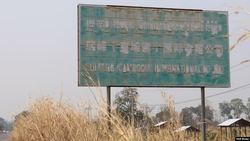Massive Chinese sugarcane firm disappears from Preah Vihear

Chinese sugarcane concessionaire Rui Feng and four linked firms seemed to have shut down their operations in the combined 40,000-hectare sugarcane plantation in northern Cambodia, with little public notice of the closure.
VOA Khmer visited the giant concession last week and found no activity at the plantation, especially at the Rui Feng processing facility, which processed sugarcane for all five firms – Rui Feng, Lan Feng, Heng You, Heng Rui, and Heng Nong. All firms have faced multiple land disputes across the 40,000 hectares, especially with indigenous minorities.
The $360 million investment, started in 2016, was billed as one of Asia’s largest sugar-producing facilities. The facility was pegged to process 20,000 tons of sugarcane and produce 2,000 tons of refined sugar, though the firm never released figures for its output.
A visit to the facilities in the province’s Chhaeb district last week revealed that the sugarcane processing plant was not operational, none of the buildings in the Rui Feng compound were occupied with workers nor were any security guards posted at the entrance.
Meas Savy, 33, who worked as a translator for the plantation’s Chinese staff, said his work had been suddenly suspended in March last year, adding that he heard hundreds of other workers had been terminated as well.
“The company told me that they will close for a while and if they come back, they will ask me to come back to work,” said Savy, who earned some $700 per month from the Chinese company.
Meas Savy said he was not given a reason for the closure, only rumors that the firm had a new shareholder.
Poeung Tryda, Preah Vihear provincial director of Agriculture, only said that the department had been informed the company was experiencing some “internal budget problems.” He added that the company may restart operations next year.
The sugarcane processing facility had created a small economy around it, where residents sold food, gasoline, and other items to the workers of Rui Feng.
Lim Sokhim, 50, said her gross income, from selling grocery and gasoline at her store had decreased from some $500 per day to just below $25 because there were no workers at the plantation.
“[Our] living conditions are now difficult after they closed the operations,” said Lim Sokhim, who has two children to take care of.
While the economic impacts of the shuttered plantation are being felt by villagers, the project left hundreds of Cambodians, many from indigenous communities, locked in land disputes. The communities have said that the firm cleared their lands, much of which was ancestral and spirit forests and communal landholdings.
The dispute is said to have affected thousands of families, many with little legal recourse to fight these disputes. The dispute has led to multiple contentious standoffs between plantation workers and indigenous communities, occasionally turning violent.
Phav Yorn, a Kuoy indigenous villager who lost six hectares of land to the sugar company, said he could use a small part of his remaining land to farm rice, but that if the plantation had shut down he should get back all of his lands.
“If the company stops activities on the land, the government should take the land back and distribute it to the villagers,” said the 60-year-old Phav Yorn.
“[And] we want the land titles legally registered,” he said.
The dispute in Preah Vihear province’s sugarcane plantation has been strongly criticized by the European Union Commission’s investigation into Cambodia’s human rights record, which could see the potential suspension of the trade privileges when the final results are released next week.
The report’s initial findings, accessed by VOA Khmer in November, estimates that more than 15,000 people had been displaced due to sugar-related economic land concessions across the country, with the dispossession of land felt by families in Preah Vihear, Kampong Speu, Koh Kong and Oddar Meanchey.
VOA Khmer visited the Rui Feng company office in Phnom Penh but found it to be closed, with multiple attempts to call listed phone numbers going unanswered.
Prak Sovann, Preah Vihear provincial governor, and Srey Vuthy, the spokesman for the Ministry of Agriculture could not be reached for comments.
Apart from land disputes, local villagers and an NGO that assists indigenous minorities said that the company had started growing rice on a part of the plantation, in violation of their agreement with the government.
Poek Sophorn, executive director of Ponlok Khmer, said the company has violated the contract because the ELC was allowed to grow sugarcane, rubber, and eucalyptus.
“If an ELC is for growing rice, why not rent the land to Cambodian villagers. It has more benefits,” he told VOA Khmer.
Lor Chann, human rights coordinator of Adhoc in Preah Vihear, said growing rice meant the ELC was competing with local farmers on land that was used by those farmers.
“I don’t understand why the company grows rice to compete with villagers? They are only allowed to grow sugarcane,” he said.












